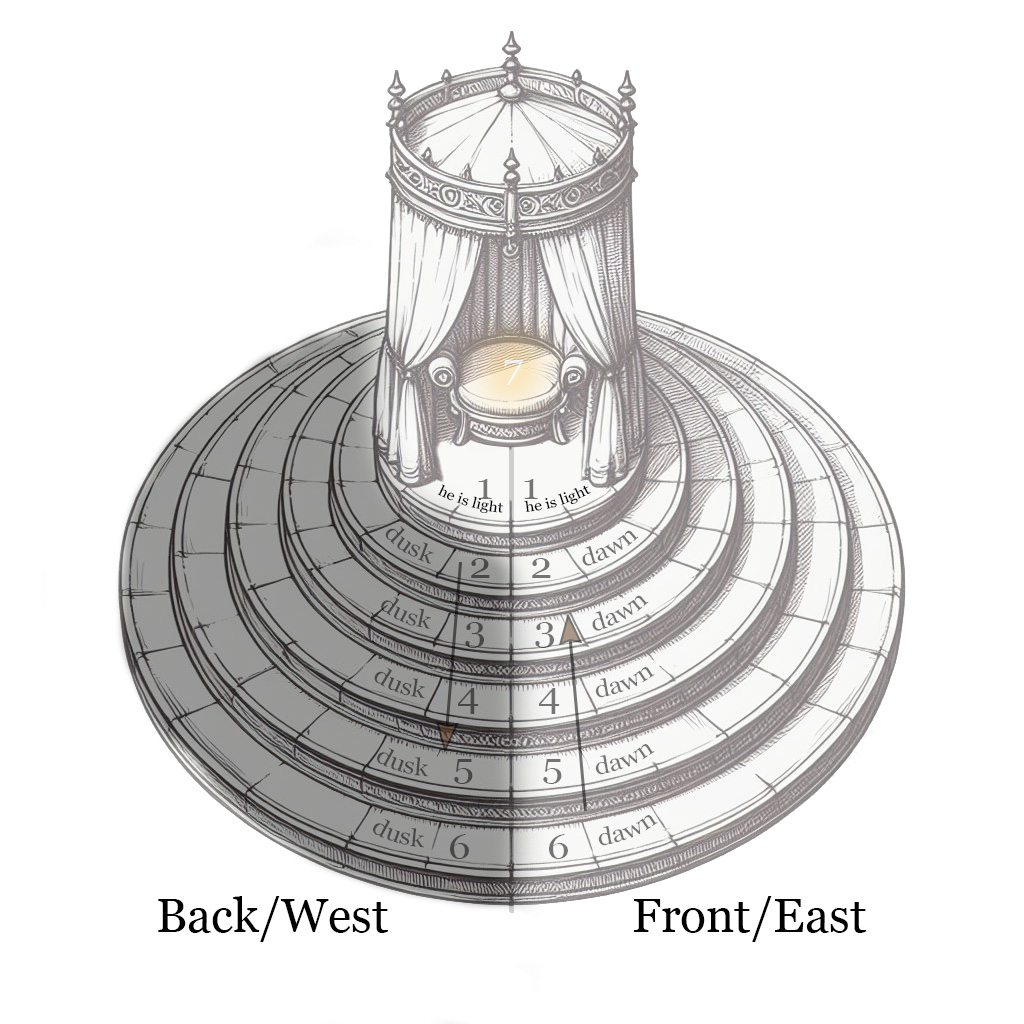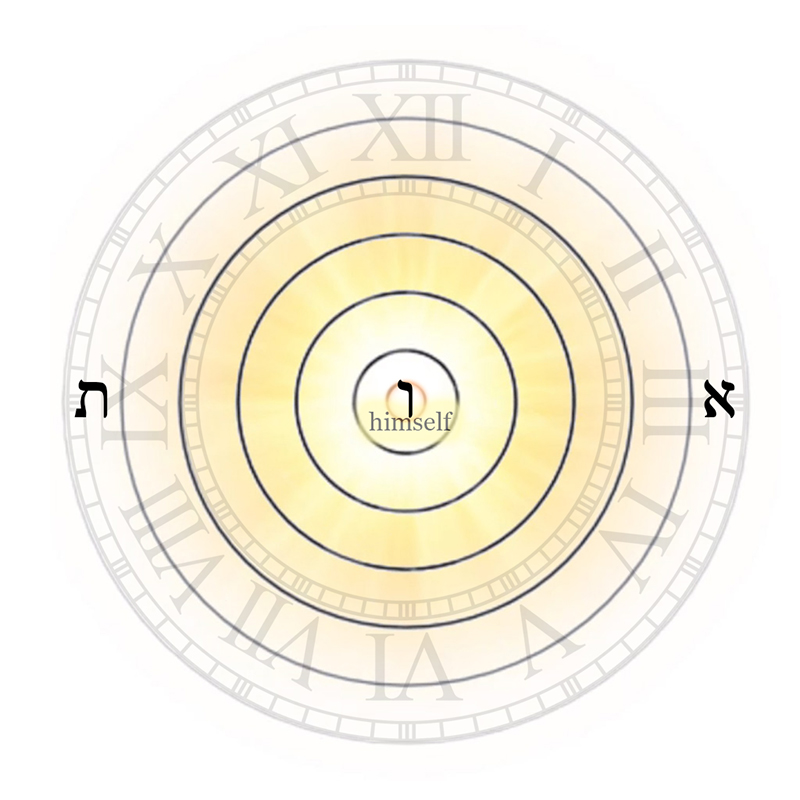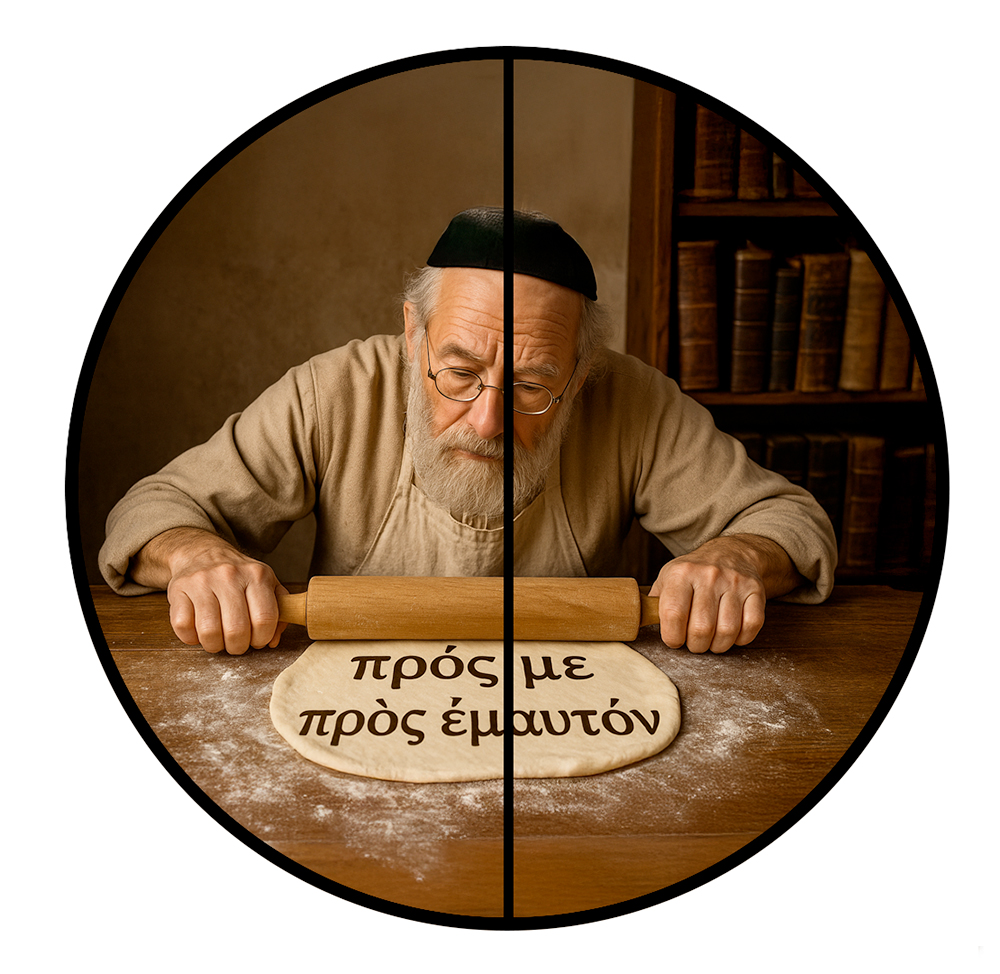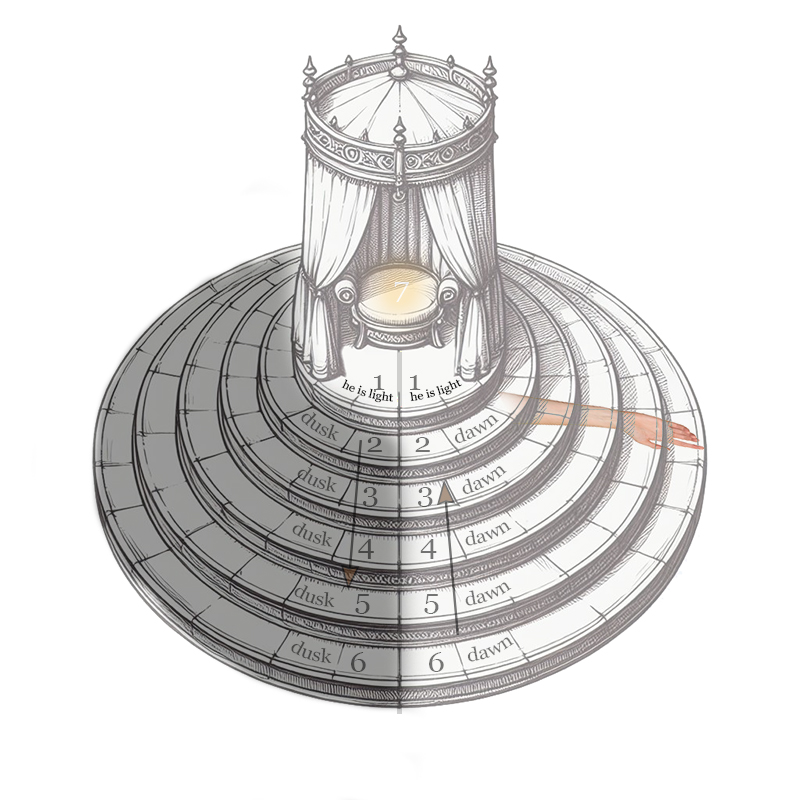He is Favored 12
פסח Pasach = Leap/skip over
Therefore the Salvation, in front of six days of the Leap Over ("Passover/Pasach"), came into House of Misery, where he was being Helpless, whomever Salvation woke up from out of dead ones.
ἀνακειμένων - Dedicated as an offering
Therefore they made an evening meal for self in that place, and the Mistress ("Martha") kept dust-kicking/serving, and the Helpless, he was being one from out of the ones who are being dedicated in sync with self."Your Hair is a Flock of Upside Down Goats" Overturn her...
Therefore the Bitter-Rebel, she who has taken hold of a pound [twelve ounces] of a very costly fragrant oil of unadulterated spikenard, anointed the Feet of the Salvation and wiped off the Feet of himself with the Hair of herself, and the House, she was filled up from out of the Fragrance of the Fragrant Oil.The Tongues Keeper - A Man of the Meeting Places
And Caster ("Judas") the Man of Cities is saying, one of the Learners of Self, the one who is destined to hand over himself,πέρνημι - Selling/Exporting Slaves, Bribes
"For what reason was the Fragrant Oil, this one, not exported for sale for three hundred ten coins ("denarii"), and was given to cowering ones?"
Strong’s #5771, avon. Bent one, bowed. From #5753, avah, to bend, twist. The opposite of being “straight/happy”. The basic verb has been interpreted to be figurative for perversity, iniquity, crooked, amiss.
"And Spearhead is saying toward He Is, 'Greater is the bent one of myself than can be carried." (Genesis 4:13 RBT)
τὰ βαλλόμενα = projectiles, things being launched or thrown (arrows, stones, spears)
And this thing he said, not because he was taking care of self around the Cowering Ones, but rather because he was being a thief and the one who is holding the Tongues-Case; the Missiles, he kept taking up.96Therefore the Salvation said, "Hurl away herself so that into the Day of the Burial Preparation of myself she might watch over self."
For the Cowering Ones you are holding at all times in company with your own selves, but myself you are not holding at all times!
Therefore the multitudinous Multitude from out of the Casters recognized that there He is, and they did not come because of the Salvation alone but rather so that they might also perceive the Helpless, whomever he woke up from out of dead ones.
Their Doctrinal Solution to the Helpless
But the Arch Priests devised/deliberated so that the Helpless they should also kill away.Because many of the Casters were leading under across to the other side of himself, and were trusting into the Salvation.
On the Tomorrow, the multitudinous Multitude, the one who has come into the Feast Day, those who have heard that the Salvation is coming into Foundations of Peace,
they kept taking hold of the Young Palm Fronds of the Palm Trees and came out into a face-to-face-encounter with self and they kept howling, "Deliver, please, well-spoken one! The one who comes within a name of 'Master' and 'the King of the God Contends!'"

And the Salvation, he who has found a little ass, sat down upon self, as he is written,
"The Onocentaurus"
"Fear not, built one ("daughter") of Monument ("Zion")! Behold, the King of Yourself is coming, he who sits down upon a young colt of a (mother) donkey."
"Spin around exceedingly, built one ("daughter") of Monument! Sound a blast, built one ("daughter") of Foundation of Peace! Behold, your king is coming in to yourself, a just one, and he who is delivered! Himself is a poor/afflicted one, and he who rides upon a male ass, and upon a young colt, the builder (son) of female donkeys." (Zechariah 9:9 RBT)
And Heel-Chaser is saying toward Stall-Fed the mother of himself, `Behold Prepared, my brother, is a hairy [sa'iyr] man, and myself is a smooth man.` (Genesis 27:11 RBT)
שעיר"sa'iyr"Strong’s #8163, sa’iyr. Hairy one. The Greek Speaking Jews in the 2nd century BC translated this word as used in Isaiah 34:14 in the LXX as ONOCENTAUROS, the Greek mythological half-man, half-donkey creature. The Azazel (Scapegoat) was to be a sa’iyr (hairy one) of the female goats in the Atonement rite in Leviticus 16.
They Did not know the Donkey was themselves
The Learners did not recognize these things of himself in the First One, but rather when Salvation was glorified, at that time they remembered that these things were being upon self, those that have been drawn/written, and they made these things to self.The One Who is With Himself
Therefore the Multitude was bearing witness, the one who is in company with himself, when he crowed to the Helpless from out of the Memorial, and woke Himself up from out of dead ones.Because of this the Multitude also face-to-face-encountered self, because they heard this, to have made himself the Sign.

The Order has gone away after himself
Therefore the Separatists said toward their own selves, "Do you look/notice that you are not benefiting anyone? Behold! The Order has gone away hereafter to himself!"And they were being Heathen ("Greeks"), certain ones from out of those who are climbing up, so that they might prostrate/kiss within the Feast Day.
We want to perceive!
Therefore these ones drew near to Horse Lover, the one who was away from House of Hunting of the the Circuit , and they were questioning himself, those who are saying, "Master, we desire to perceive the Salvation!"The Horse Lover is coming and he is saying to the Manly One, "Manly One is coming, and Horse Lover!" And they are speaking to the Salvation."97
She has come!
And the Salvation separated to themselves, he who is saying, "She has come, the Seasonal Time, so that the Son of the Human might be glorified!Trustworthy One Trustworthy One! I am speaking to yourselves unless the Grain of the Wheat, he who has fallen into the Earthly One, should die away, he, himself remains solitary. But if he should die away, he is carrying much fruit!
The one who is philo-loving the Soul-Life of himself, destroys away herself, and the one who hates the Soul-life of himself within the Order, this one, he will protect herself into an eternal (aion) zoe-life!
διακονῇ - act as agent, surrogate
If anyone should stand-in for myself, let him accompany myself, and where I, Myself am, there also the Agent, my Own, will be! If anyone stands-in for myself, the Father will honor himself."Time travel"
the Soul-life of myself, she has been stirred, and what should I speak? Father, save myself from out of the Hour of this one, however because of this I have come into the Hour, this one.
A voice from out of the Father, the Heavenly One...
Father, glorify the Name of yourself!" She came therefore from out of the Heavenly One, a voice, "I have also glorified!" and backward, "I will glorify!"
The Multitude therefore, the one who has stood ready and who heard, kept speaking to become a thunder. Other ones kept saying, "An angel has chatted to self."
Salvation separated and said, "She, herself, the Voice, has not become because of myself, but rather because of yourselves!

"And she is lifting up, the entire Summoned Assembly, and they are giving the self-eternal voice of themselves, and they are bewailing, the People within the Night of That One."
(Numbers 14:1 RBT)The Ruler = The Death, She = The Mother of Life
, she is a separation of the Order, this one! the Ruler of the Order, this one, will be cast outside!ἐμαυτόν = my own self or oneself
And if I, myself am also exalted high from out of the Earth, I will draw everyone toward oneself!"97a
"Hmm.""They're clearly the same!"
And this thing he was speaking, he who is giving a sign for which death was destined to die away.97b
Separated therefore the Multitude to self, "We, ourselves heard from out of the Usage that the Anointed One is abiding into the Eternal (aiōn) One, and how are you, yourself saying that it is necessary for the Son of the Human to be exalted high? Who is this one, the Son of the Human?"
Said therefore to themselves the Salvation, "Still yet, for a little chronological time, the Daylight is within yourselves. Tread around while you are holding the Daylight so that a dark one may not catch/overtake yourselves, and the one who is treading around within the Dark One, he does not see where he is leading on.
He was Hidden Away
While you are holding the Daylight, trust into the Daylight so that you may become sons of daylight, These things Salvation chatted, and he who has gone away was hidden away from themselves.The Sons Didn't trust into himself
And of him who has made so many signs of himself in front of themselves, they were not trusting into himself,so that the Logos/Word of He Is Liberates Himself ("Isaia-hu"), the Prophet, might be filled up, which he spoke, "Master, who has trusted the Hearing of ourselves? And the Arm of the Master, to whom has he been unveiled/revealed?"

Because of this they had no power to trust, because He Is Liberates Himself ("Isaia-hu") spoke backward,
"He has smoke-blinded the Eyes of themselves and he has stone-petrified the Heart of themselves so that they should not perceive with the Eyes," and "May they understand with the Heart and may they rotate around" and "I will heal themselves!"
He Is Liberates Himself ("Isaia-hu") spoke this one, because he perceived the Glory of himself and he chatted around to himself.
Nevertheless indeed, even from out of the Rulers multitudes trusted into himself, but rather because of the Separatists they were not acknowledging so that they should not become excommunicated ones.
For they agape-loved the Glory of the Humans more than the Glory of the God.
Rest Sent the Raven - Genesis 8:7
But Salvation cawed [as a raven] and said, "The one who trusts into myself, is not trusting into myself but rather into the one who has sent myself.
And the one who looks attentively at myself, looks attentively at the one who has sent myself!

I, Myself, a light, have come into the Order so that everyone who trusts into myself, should not remain within the Dark One.
And if anyone is hearing the Sayings of myself and should not watch over, I, myself am not separating himself, for I have not come so that I should separate the Order, but rather that I might save the Order.
Holding the One who Separates
The one who displaces myself and who does not take hold of the Sayings of myself, he is holding the one who separates himself. The Logos/Word which I chatted, that one will separate himself within the Last Day.For I, Myself have not chatted from out myself, but the one who has sent myself, a father; He, himself gave to myself a commandment, who I should speak and who I should chat.
And I am perceiving that the Commandment of himself, she is an eternal (aion) zoe-life. Therefore whatever things I, myself am chatting, according as the Father has spoken to myself, in this way I am chatting!"
Footnotes
The Tongues Case
Strongs Greek NT #1101 γλωσσόκομον, glóssokomon. Tongue Keeper/Case, Language Guardian.
The word "γλωσσόκομον" (glōssokomon) is a compound word in ancient Greek. It is composed of: "γλῶσσα" (glōssa): meaning "tongue" or "language." "κομός" (komos): meaning "care," "attention," or "keeping." So, "γλωσσόκομον" refers to a person or object that deals with or is involved in the management, study, or preservation of languages. It could be translated as "language keeper" or "language guardian," and it may refer to a linguist, a scholar of languages, or a repository of linguistic knowledge. Used for "Chest" which held money in the Septuagint (2 Chr 24:8, 2 Chr 24:10, 2 Chr 24:11).
The word only occurs in John 12:6 and 13:29. It is a specific New Testament version of an earlier word, γλωσσοκομεῖον, (glōssokomeion). Translators and scholars have traditionally referred to the earlier version for definition:
Strong's Exhaustive Concordances:
"From glossa and the base of kosmos; properly, a case (to keep mouthpieces of wind-instruments in) i.e. (by extension) a casket or (specially) purse -- bag."
Thayer's Greek Lexicon:
- a. a case in which to keep the mouth-pieces of wind instruments.
- b. a small box for other uses also; especially a casket, purse to keep money
Bill Mounce:
Rendering τὰ βαλλόμενα as "things that are put" is imprecise and generally incorrect in classical or Koine Greek contexts.
-
Primary Sense of βάλλω:
-
The core meaning of βάλλω is "to throw," "to cast," "to strike," especially with force or motion.
-
In both Homeric and post-Classical Greek, this verb retains the semantic field of propulsion, hurling, or shooting (e.g., spears, stones, missiles).
-
-
"Put" Is Not a Natural Semantic Equivalent:
-
"Put" implies gentle placement or setting something down, which aligns more with verbs like τίθημι (to place, to put), not βάλλω. John understands the meaning of τίθημι and uses it frequently. Thayer's Greek Lexicon states the rare idiomatic usage of βάλλω: "to move, give motion to, not with force yet with attention and for a purpose"
- The LSJ places this usage under II.6.c, a special sub definition for a usage only found in later certain lyrical, metaphorical, or ritual contexts. (i.e. laying bricks, pouring, etc) These broader meanings of βάλλω (e.g., "to put," "to place," "to deposit") are colloquial, idiomatic, and context-dependent extensions of its core meaning ("to throw").
-
Even in passive voice, βάλλομαι typically suggests being struck, not merely being placed.
-
-
Contextual Support:
-
The definite article (τὰ) lends weight to the meaning of "things thrown/hurled" or "the Projectiles" over a weaker idiomatic sense "things being put." For example, in military or ritual contexts, τὰ βαλλόμενα would naturally be understood as "the things being thrown"—such as missiles, offerings, or ritual castings. The definite article (τὰ βαλλόμενα) emphasizes the action of being thrown in progress, not merely having been placed somewhere. It implies that these “thrown things” are part of a recognizable class (e.g., weapons, stones, arrows).
-
The definite article reinforces the substantive participial phrase,
-
retains the core motion semantics of βάλλω,
-
and indicates a concrete, classifiable object, especially in military or combative contexts. The substantive "things that are put" is impossible to classify in any meaningful way.
Therefore rendering it merely as “the things that are put” risks flattening both the verbal aspect and the implied context of motion or aggression. What about "the things that are put into a box/bag"? This is a substantivized clause, but notice, it is still very ambiguous, and requires adding the word "in/into" which is not present. What are "Things Put into A Bag"?
-
- Only in specific idiomatic contexts (e.g., βάλλειν εἰς πίθον “to place in a jar”) or certain Koine usages can βάλλω lose its original motion semantics (notice the need for the word εἰς "into"). Without such context, τὰ βαλλόμενα will be interpreted by Greek readers as missiles/projectiles, not just “items placed.”
-
There is no word "in" or "into." One can take note for themselves how "into it" is forced into this particular interlinear translation, the definite article is mischievously altered/used in the sense of a relative pronoun "which/that" and the plural sense is all but wiped out:
- By what authority do these scholars tamper with the words in this way? Rendering τὰ βαλλόμενα as “that which is being put into it” is very crafty, in the sense that it deliberately downplays the lexical and aspectual force of the phrase for a more neutral or euphemistic effect. Further, this altering of the plural and the definite article is falsifying. It is not honest. Such a rendering subtly dilutes the martial or violent connotation inherent in βάλλω (especially in its classical and formal senses), and it might serve rhetorical or theological aims—but at the cost of philological honesty. Such translations would be more honestly dubbed "dynamically engineered translations" or "euphemistic translations." Yet, nearly all of them seem to be marketed as "accurate" or "faithful." Really?
-
Correct Renderings:
-
“the things being thrown”
-
“the projectiles”
-
“the things being cast”
-
Less commonly, with figurative use, possibly “the things being inflicted” (e.g., blows, sufferings)
In late or metaphorical usage (e.g., emotions being hurled, words cast out), the range can broaden, but “put” remains too far removed from the core action of βάλλω.
he carried, took up. The word ἐβάσταζεν also gets hacked by a number of translations rendering it as "steal" (NASB, NRSV, BLB, NLT, Weymouth, etc, etc) It does not mean steal. The LSV, YLT, Julia Smith Literal give the accurate rendering:
-
“he was carrying” (YLT)
-
“he was carrying” (LSV)
-
“and carried” (Julia Smith)
The supposed usage of βαστάζω in John 12:6 as “steal” is a marked departure from its classical semantic field, where it predominantly denotes physical bearing or emotional endurance. While a few post-Classical sources (e.g., Polybius, Lucian) attest furtive or appropriative nuances, the scholars' application of the verb to Judas Iscariot exploits this marginal semantic possibility, resulting in a contextually derived but lexically unconventional meaning. The verb thus illustrates a semantic broadening in late Koine, partially shaped by idiomatic and narrative exigency, rather than linguistic norm.
In John 12:6, then, this sense of the verb requires a highly idiomatic usage:
-
The idea of surreptitious removal (hence "stealing") is not lexically encoded in βαστάζω per se but is inferred from the context of "he was a thief".
-
The scholars must assume that John is exploiting the range of the verb—from innocent “carry” to the contextually negative “carry off (wrongfully)”—to achieve a loaded, ambiguous effect.
- However the Septuagint and other Jewish-Greek texts use βαστάζω in neutral or literal senses, typically “carry” or “bear” (e.g. bearing burdens, carrying the ark, etc.), with no inherent negative valence.
We are led to believe this idiomatic usage is pervasive throughout the NT. This, we are told, is how Koine Greek works, being as it is, a common lingua franca, with more colloquial range than Classical Greek.
Koine (Common) Greek Usage
To build theology, ontology, or ecclesial structures on language that trades in idiomatic elasticity is, by classical standards, precarious. What then exactly is the "The New Testament Usage"? The Usage of Koine that we are given is very frequently:
-
Semantically diffuse: e.g. βαστάζω—apparently can mean “carry,” “endure,” “steal,” or “lift up” depending on a sliver of context.
-
Syntactically pleonastic or elliptical: frequent asyndeton, parataxis, and Semitic calques blur syntactic clarity.
-
Lexically unstable: words like λόγος, σάρξ, πνεῦμα, δίκαιος bear multiple overlapping (and at times conflicting) semantic layers.
The irony here is that this porous linguistic ground tends to fulfill the very prophetic metaphor of building “on sand” (cf. Matt. 7:26). To say that this is ironic is not just being rhetorically effective; it's epistemologically apt. The textual tradition invites trust and belief, but does not give certainty through philological precision.
The issue remains: meaning is underdetermined in many key NT passages—not because of poor writing, but because of intentional polyvalence and the limitations of Koine itself.
This semantic underdetermination leads directly to:
-
Doctrinal multiplicity: the same passage is taken as prooftext for mutually exclusive positions.
-
Exegetical contestation: theological debates (e.g. predestination, justification, logos theology) hinge on words whose meanings were never rigorously defined in Koine usage.
-
Translation dilemmas: modern renderings must either flatten, choose, or footnote interpretive ambiguity.
Koine’s instability functions not only as a medium but as a theological instrument. The traditional Gospel of John, for instance, is exploiting semantic ambiguity for theological depth. Consider:
-
ἄνωθεν (John 3:3): “again” vs. “from above” (RBT retains the precise meaning over the ambiguous, from above)
-
βαστάζω (John 20:15): the tradition “steal/pilfer” vs. "carry/take up" (RBT uses the precise, carry/take up)
-
καταλαμβάνει (John 1:5): the tradition “comprehend” vs. “seize/overtake" (RBT uses the precise, seize/catch)
(Strong’s #G2638, katalambanó. To seize tight hold of, arrest, or catch down. Especially of the hand taking hold.)
The traditional NT's idiomatic Koine creates interpretive instability. Though meanings persist, their range precludes doctrinal precision. This is why the traditional Gospel stands on semantically shifting terrain, a fact that is well attested by the inumerable doctrinal divisions and countless church splits that have persisted since the start.
In other words, the traditional NT is sand.
In spite of the broad idiomatic ranges of Koine Greek, the underlying semantic infrastructure of Greek remains intact. The core lexemes are not lost. Therefore, a translation that is philologically rigorous (tracking morphology, syntax, and semantic ranges), non-theological (eschewing doctrinal overlays), historically contextualized (respecting 1st-century Hellenistic idioms), can produce a concrete rendering—one that favors lexical precision over theological tradition or interpretive smoothness.
Such a translation would have to make difficult choices, especially when a Greek word has multiple plausible senses (e.g. βαστάζω, λόγος, σῶμα). But it could legitimately render:
-
βαστάζω as "carry" even where tradition prefers "steal" (John 12:6),
-
κεφαλή as "head" without importing "authority" (Eph. 5:23),
-
δικαιοσύνη as “just-dealing” rather than “imputed righteousness” (Romans).
The result would be technically accurate, but theologically destabilizing—because it would strip away centuries of doctrinal accretion and force readers to confront the text’s raw lexical surfaces. The obstacle is not the Greek itself, but the weight of interpretive tradition, the ambiguity left by authorial intent, and the modern reader’s expectation that religious texts be theologically consistent and immediately comprehensible. Much of post-NT theology rests not on the raw Greek, but on translated, interpreted, harmonized, or doctrinally massaged renderings. When we restore the actual voice and syntax of the text, strip away the smoothing effect of ecclesiastical translation traditions, and refuse to resolve lexical ambiguity prematurely, indeed we risk destabilizing received doctrine. The result of undoing centuries of scholarly interpretation very well could be a giant mess, or, perhaps we might gain access to a latent doctrinal architecture that may have been hidden in plain sight?
Greek λέγει τῷ Ἀνδρέᾳ ἔρχεται Ἀνδρέας. he is speaking to Andrew, he is coming Andrew... There is no conjunction between these words. The names are repeated in the nominative for a reason. They are speaking to themselves.
Oneself
John makes a rare and unique usage of the reflexive pronoun for self, ἐμαυτοῦ. The phrase ἑλκύσω πρὸς ἐμαυτόν is normally rendered as "I will draw toward myself" but this is less than accurate. The emphasis is on the reflexive ἐμαυτόν "self" so this rendering loses the reflexive aspect. On the other hand, it also means "I will draw toward oneself," employing the reflexive pronoun ἐμαυτόν to indicate that the action is directed back upon the subject’s own person. This reflexive construction is the standard and classical Greek method for expressing an action oriented toward oneself, as opposed to simply "toward me" (πρός με), which lacks an inherent reflexive force and denotes a non-self-referential direction.
Attested Usage
The phrase ἐν ἐμαυτῷ συννοεῖσθαι (to think in or with oneself), attested in Euripides’ Orestes (line 634), illustrates the dative reflexive pronoun ἐμαυτῷ employed with ἐν to express internal reflection or contemplation “within oneself.”
More relevant is πρὸς ἐμαυτόν, found in Aristophanes’ Ranae (53) and other sources, which uses the accusative reflexive pronoun ἐμαυτόν with the preposition πρὸς to indicate motion or direction “toward oneself,” often with a strengthened or intensified reflexive sense.
These examples attest to the nuanced deployment of the first-person reflexive pronoun in classical Greek, where:
-
ἐν ἐμαυτῷ conveys internal mental activity or self-reference in the dative case;
-
πρὸς ἐμαυτόν conveys physical or metaphorical orientation toward oneself in the accusative.
This unique usage is not accidental. For example, in the Johannine corpus, the distinction is evident: πρός με in John 5:40 expresses "toward me/myself" without reflexive emphasis, while πρός ἐμαυτόν in John 12:32 underscores a reflexive direction, "toward oneself." This illustrates how ἐμαυτόν uniquely signals the inward, self-referential dimension of the action, which cannot be conveyed adequately by the personal pronoun alone.
Thus, to express "draw toward oneself" reflexively in Ancient Greek, the use of πρός with the appropriate reflexive pronoun (ἐμαυτόν for first person singular) is effectively the only idiomatic and precise formulation.
In otherwords, if one intended to say "I will draw all toward one's own self" in Greek, this is the only way to say it, as there is no separate Greek word for "oneself."
This is especially evident in contexts where the reflexive pronoun is used with verbs or phrases implying control, self-mastery, or introspection. For example, Plato’s ἐν ἐμαυτοῦ (sc. οἴκῳ) εἶναι (“to be master of oneself”) shows the pronoun taking on a possessive and reflexive nuance — not simply referring back to the subject, but emphasizing ownership or dominion over one’s own self.
Flattening Self
The real question then, is whether there is any point to John's switching back and forth between using πρός με and πρὸς ἐμαυτόν to say the same exact thing to the common person?
(cf. LSJ ἐμαυτοῦ)
Greek ποίῳ θανάτῳ ἔμελλεν ἀποθνῄσκειν.
-
ποίῳ (poiō): This is an interrogative pronoun meaning "what/which/who."
-
θανάτῳ (thanatō): This is the dative masculine singular form of the noun θάνατος (thanatos), meaning "death."
-
ἔμελλεν (emellen): This is the imperfect indicative form of the verb μέλλω (mellō), meaning "to be about to."
-
ἀποθνῄσκειν (apothnēskein): This is the present infinitive form of the verb ἀποθνῄσκω (apothnēskō), meaning "to die."
The rendering "which death he was about to die" is a semantically bizarre phrase. The Greek emphasizes the pronouns so much that it is hard not to notice the intentional absence of one here. Revelation 20:14 speaks of a Death that is "cast away" as well as "death swallowed", etc.